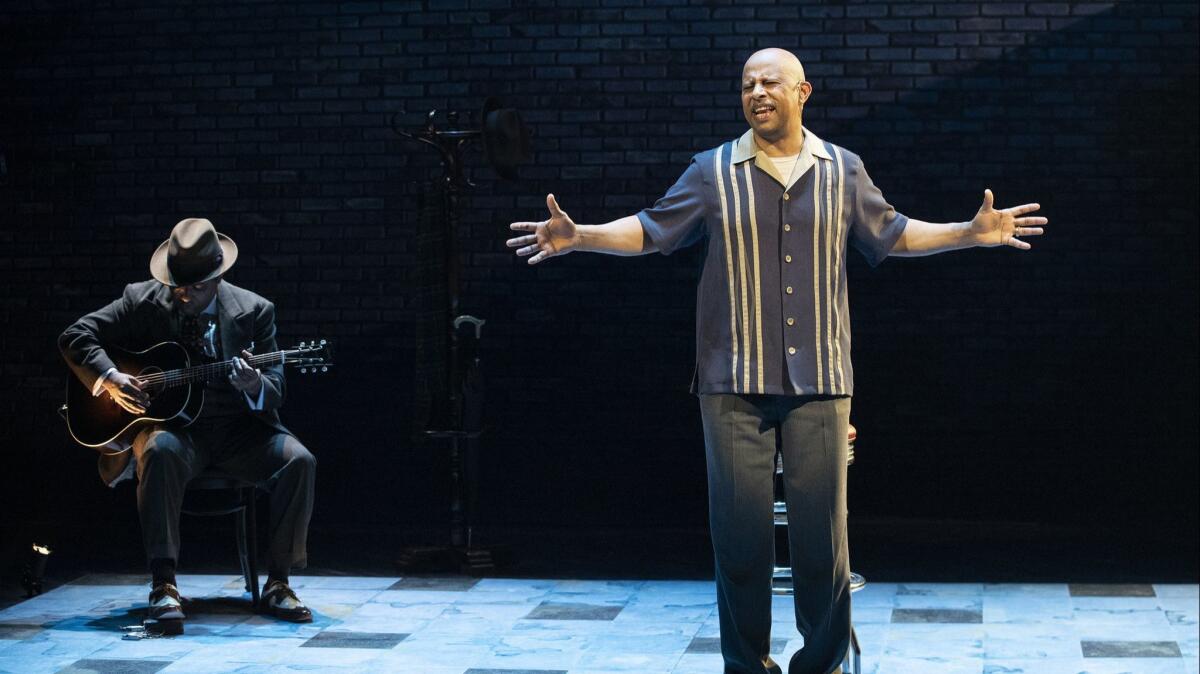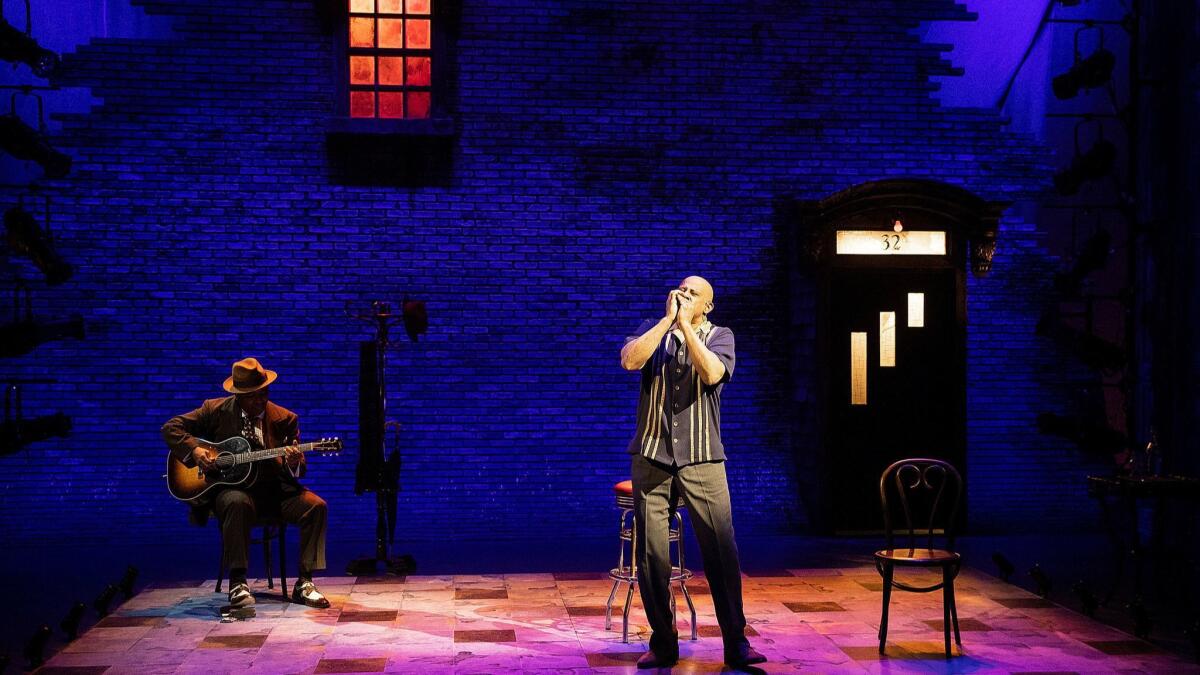Review: âLackawanna Bluesâ is potent as live memoir, an actorâs tribute to the woman who rescued him

âLackawanna Blues,â Ruben Santiago-Hudsonâs theatrical memoir about being raised by a big-hearted proprietor of a boardinghouse for castaways and strays in an industrial upstate New York city near Buffalo, was turned into a TV movie that won S. Epatha Merkerson an Emmy Award. But the compact stage version at the Mark Taper Forum â written, directed and performed by Santiago-Hudson â is still the most potent way of experiencing the story.
Santiago-Hudson, a Tony-winning actor and talented stage director whoâs one of the foremost interpreters of August Wilsonâs plays, beautifully merges his autobiographical narrative with music. Standing onstage with a harmonica in hand and accompanied by Chris Thomas King on guitar, he takes us back to his beginnings with a blues-infused portrait of the surrogate parent he found in Rachel Crosby, a radiant soul who more than earned the nickname of âNanny.â
Young Santiago-Hudson came under her care once she learned that his mother was leaving him alone in one of her rooming houses. It was the best thing that had ever happened to him.
Nanny, who he says was âlike the government if it really worked,â combined softness with steel. Her inexhaustible kindness drew customers to her boardinghouses, restaurant and after-hours club, but it was her indomitable strength and discipline that allowed her businesses to flourish. Sheâd cook, console and hand out cash, but she didnât play.
A safety net for those who had fallen through the cracks, she took in crazies, drunks and other so-called hopeless cases. But she had rules of conduct that she embodied so completely that those who were the recipients of her generosity would feel too ashamed not to at least try to live up to her example.
Santiago-Hudson loved her so much as boy, he worried that, at 63, she could die before he could handle such a loss. âCome here, give me a hug ⌠with both arms,â she told him, explaining that death âis just part of the deal you make when youâre born.â She prayed that when the time came she would kneel at the feet of Jesus and hear him say, âWell done.â But she made sure she stayed around long enough to give her âsonâ everything he needed first.

âLackawanna Blues,â originally produced by New Yorkâs Public Theater in 2001, is populated with âcharactersâ that Santiago-Hudson animates with his storytelling prowess. The army of bedraggled eccentrics includes Olâ Po Carl, a 79-year-old former Negro Leagues baseball player, who says his doctor told him to give up whiskey because of âroaches of the liver,â and âorthodontically challengedâ Sweet Tooth Sam, who was as intimidatingly large as he was unhinged.
Occasionally, Santiago-Hudson taps the oddball extremes for easy laughs. The brawl between one-legged Lemuel Taylor, whom Nanny rescued from a mental hospital, and Numb Finger Peter, who lost his fingers after drunkenly falling asleep in the Buffalo snow, is presented as the ânumb-fingered, one-legged fight of the century.â
But even when the story gets broad, the language has the lyrical rhythm of song. Santiago-Hudson rattles off names in the old neighborhood (Cockeyed Shakey, Bo-Jack, Finger Willy, Lackawanna Smitty) in a riff thatâs part rap, part bebop.
When I first saw âLackawanna Bluesâ at the Public, Bill Sims Jr., who composed the original musical, was onstage next to Santiago-Hudson. Sims died earlier this year, and King, who has contributed additional music, is now smoothly at Santiago-Hudsonâs side.
âDIANA,â THE MUSICAL: British princess seems as American as Broadway song and dance Âť
The new production preserves the old synergy, but Santiago-Hudsonâs performance has grown only more relaxed and assured. Standing before a re-creation of the boardinghouse façade in vintage 1950s garb evoking the period of his youth, he conjures multitudes with his rich memory and malleable voice. But more than his gift for portraiture, itâs his talent for vividly conjuring a way of life that enthralls.
Part of Wilsonâs mission in his magisterial 10-play cycle chronicling the African American experience in the 20th century was to fulfill James Baldwinâs call for a âprofound articulation of the black tradition.â Taking a page from Wilson, Santiago-Hudson lovingly captures the customs of the community (the famous fish sandwiches with the wilted lettuce and special sauce, the late-night letting-it-all-hang-out dancing, the joys of scalp greasing) that formed not only his own character but his artistic appreciation of âcharacter.â
Nanny taught him to see the humanity that difference and difficulty could conceal. In return, he has brought her formidable dignity back to life and with it the Lackawanna community she helped raise and raise up with the force of her goodness.
⌠⌠⌠⌠⌠⌠⌠⌠⌠⌠âŚ
âLackawanna Bluesâ
Where: Mark Taper Forum, 135 N. Grand Ave., L.A.
When: 8 p.m. Tuesdays-Fridays, 2:30 and 8 p.m. Saturdays, 1 p.m. Sundays; ends April 21 (call for exceptions)
Tickets: $30-$109 (subject to change)
Information: (213) 628-2772 or centertheatregroup.org
Running time: 85 minutes, no intermission
More to Read
The biggest entertainment stories
Get our big stories about Hollywood, film, television, music, arts, culture and more right in your inbox as soon as they publish.
You may occasionally receive promotional content from the Los Angeles Times.











